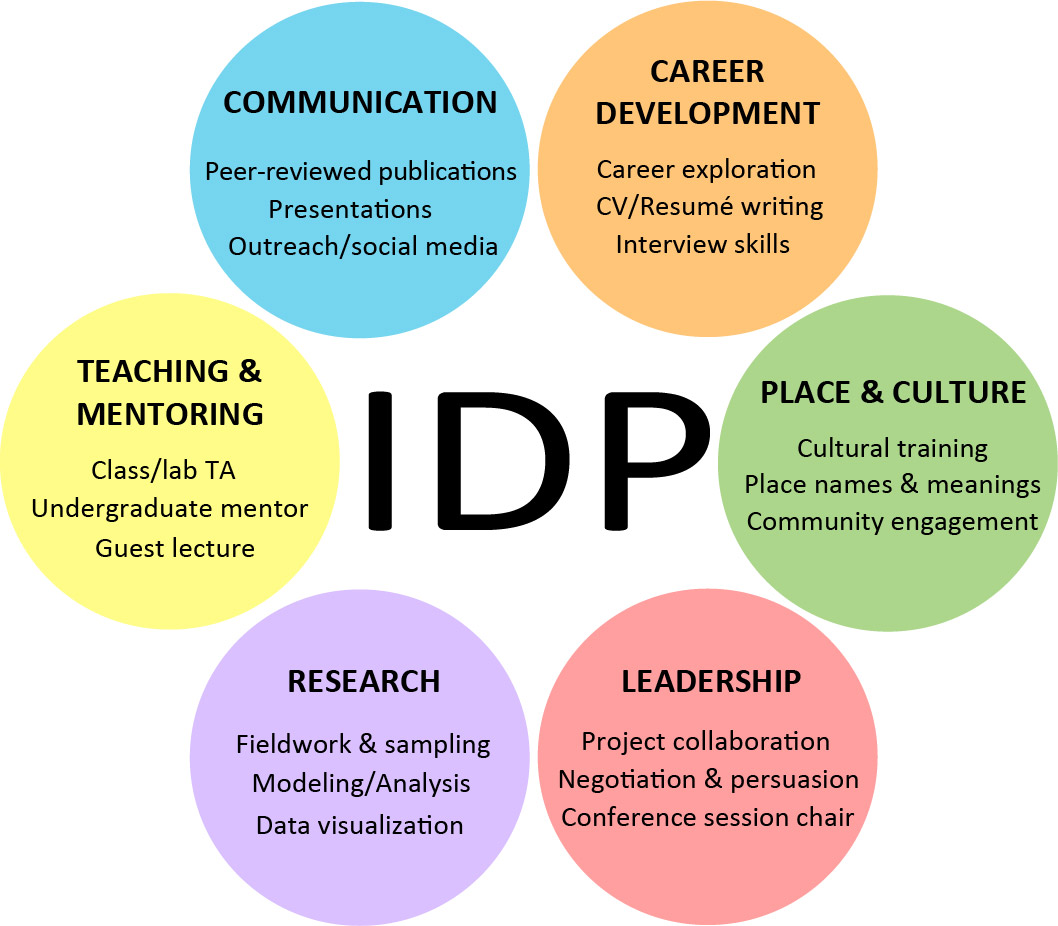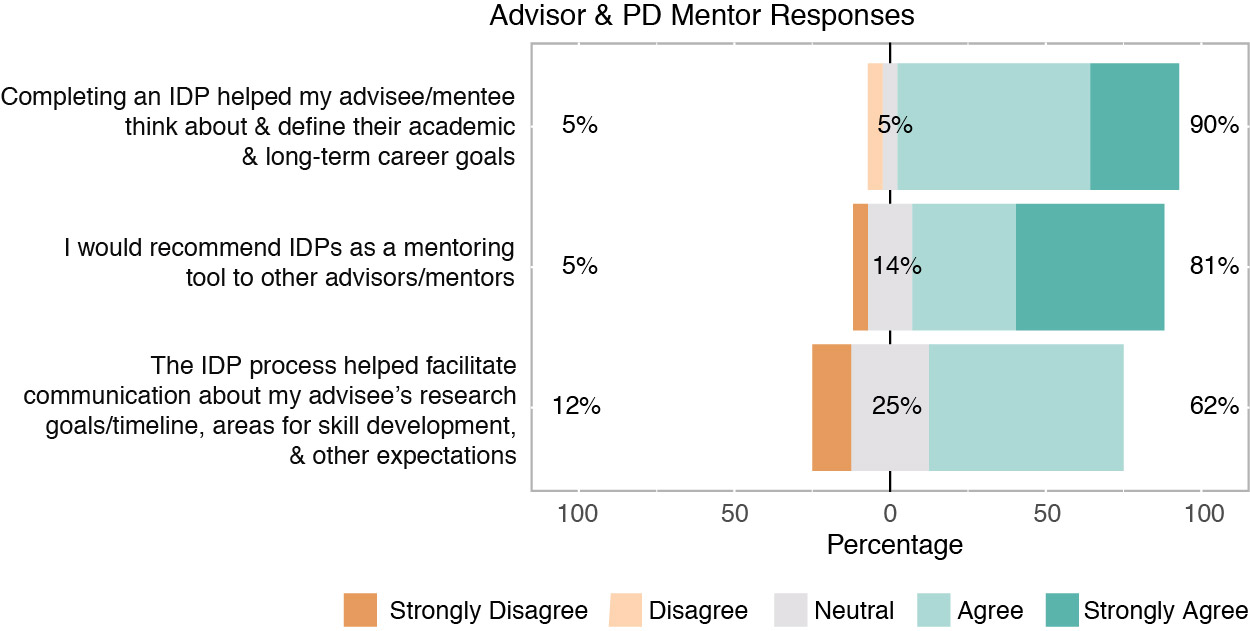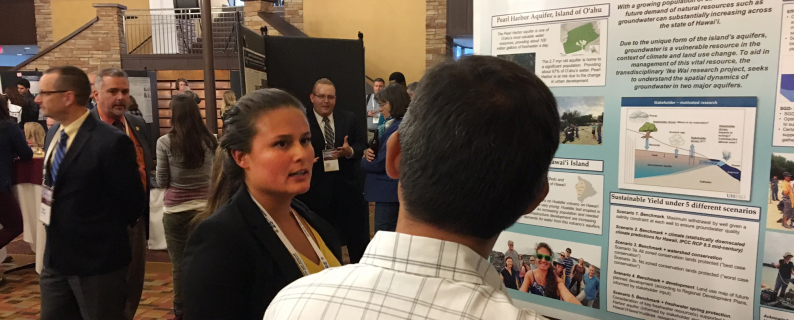Take Charge of Your Career

An Individual Development Plan (IDP) is a personal action plan designed to help graduate students and postdoctoral scholars set and achieve their academic and career goals. By providing a simple framework for self-reflection and long-term goal-setting, they help trainees be proactive and purposeful about their professional development.
Ideally, IDPs are completed with feedback from the trainee’s research advisor. We also strongly recommend getting feedback from an additional faculty member or other trusted advisor who serves as a professional development (PD) mentor. A PD mentor is preferably someone from outside the trainee’s immediate discipline or lab group who can offer an outside perspective, and help broaden their access to resources and opportunities.
Getting Started
Download the Forms… (right-click to save as)
- Guidelines & Self-Assessment (Form 1)
- IDP Form 2 (google-form; mini-version with just 3 goals)
Here is a list of Professional Development Mentors who can help you with IDP.
For advisors/mentors: Guidelines for Mentors
Graduate Students & Postdocs: These simple forms are designed to help guide you through the self-reflection and goal-setting exercises, but it’s the PROCESS that’s important, not the forms themselves. Feel free to create your own Form 2 if a different format would be more useful to you (e.g., make a shareable calendar, Google spreadsheet, or color-coded timeline). Just make sure all the same information (including specific milestones and target deadlines) is captured somewhere, and it’s easy to share with your advisor/mentor(s).
Finding a PD Mentor: In addition to getting feedback from your research advisor, we suggest also reaching out to a faculty or staff member from outside your discipline to help provide a broader perspective. Avoid asking someone you already work with closely (e.g., someone in your lab group or a close collaborator) — aim to expand your network and foster interactions with someone who isn’t so close to your research. While you may feel like your advisor is sufficient, students in our pilot program particularly valued their conversations with their PD mentors!
Need help finding someone? Here’s a list of SOEST-affiliated faculty/staff who are happy to serve as mentors — feel free to reach out to anyone on that list, even if you’ve never met. (Note that some mentors may already be overbooked. If they decline, just move on to someone else, or contact us if you need help.)
Why use IDPs?
Recently highlighted as an effective mentoring tool and best practice by the National Academies of Sciences, Engineering, and Medicine (NASEM, 2019), IDPs are highly valued as an advising tool (e.g., Hobin et al., 2014; Vincent et al., 2015; Eason et al., 2020). They can help research advisors and advisees align their goals and expectations, identify areas for improvement, and track progress. Structured mentoring and professional development opportunities have been shown to correlate with postdoctoral success (Davis, 2009).
In our recent pilot program, 81% of advisors and mentors agreed they would recommend IDPs to others, with 90% agreeing that completing an IDP helped students think about their academic and long-term career goals (see figure below). Regardless of their chosen career path, it’s important that trainees think strategically about their professional development and build the skills they’ll need for future success in a competitive job market.

More Information
myIDP — Online IDP platform from AAAS/Science. Includes a career-matching tool and resources for those interested in exploring a broad range of STEM career paths.
ImaginePhD — Online career planning tool for humanities/social sciences.
NASEM Mentoring Guide — Highlights IDPs as an advising tool in this report on mentoring best-practices.
References
Davis, G (2009) Improving the postdoctoral experience: an empirical approach. In: The Science and Engineering Workforce in the United States, ed. R. Freeman and D. Groff, Chicago: University of Chicago Press.
Eason, DE, BC Bruno, D Böttjer-Wilson (2020) Individual Development Plans (IDPs): An Underutilized Advising Tool in the Geosciences. GSA Today 30, doi:10.1130/GSATG3GW.1. paper | supplemental
Hobin JA, Clifford PS, Dunn BM, Rich S, Justement LB (2014). Putting PhDs to Work: Career Planning for Today’s Scientist. CBE Life Sci Educ 13(1): 49-53, doi.org/10.1187/cbe-13-04-0085
NASEM (2019) The Science of Effective Mentorship in STEMM. Washington DC, National Academies Press, doi.org/10.17226/25568
Vincent BJ, Scholes C, Staller MV, Wunderlich Z, Estrada J, Park J, Bragdon MDJ, Rivera FL, Bietta KM, DePace AH (2015) Yearly planning meetings: Individualized Development Plans aren’t just more paperwork. Mol Cell 58, www.cell.com/molecularcell/pdf/S1097-2765(15)00307-X.pdf
Feedback
Questions, comments, or suggestions on how we can improve these forms? Please let us know!





